Volkswagen Group Logistics can increasingly master disruptions thanks to greater resiliency, but its managing director Simon Motter is making sure the group is ready to deliver on long-term goals for electrification, sustainability and cost.
Since Simon Motter took the reins at Volkswagen Group Logistics at the start of 2021, his team and partners, like so many in the industry, have sailed from one supply chain crisis to the next: misalignment in shipping schedules and assets during the pandemic; critical shortages in semiconductor supply; supplier impacts and inflation after Russia’s invasion of Ukraine; vehicle logistics capacity bottlenecks; fallout from extreme weather, earthquakes, supplier fires and rail strikes – right up to ongoing shipping diversions from the Red Sea.
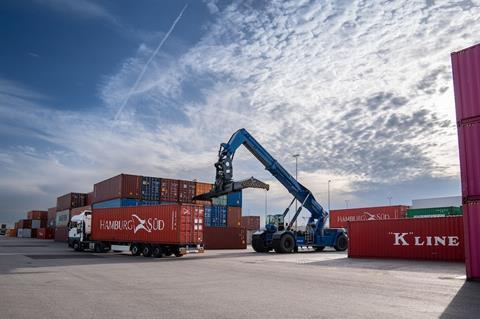
Nearly any list of crises would be incomplete given the volatility in global supply chains and the scope of Group Logistics’ functions, which include logistics partner procurement and management, international material, packaging, vehicle logistics, and logistics governance across nearly 115 plants worldwide. No matter where, no matter when, there is always something that could and likely will impact the group’s supply chain.
Motter’s predecessors at Group Logistics also dealt with disruptions. Employees at Volkswagen Konzernlogistik, as it is incorporated in Germany, have long worked in close collaboration with plants, brand logistics, procurement and manufacturing teams to keep delivery and production stable. Group Logistics was also already responsible for prioritising and allocating critical inventory, when necessary, where decisions needed to be made across plants and brands.
“In logistics, we have become more relevant and able to influence decisions, both in terms of ensuring stability, but also in terms of costs and emissions.”–Simon Motter, Volkswagen Group Logistics
However, scarcity in supply and capacity has intensified the need for this central steering and collaboration. At the worst points of supply shortages, Group Logistics was orchestrating daily supply and production decisions, notably in a taskforce for semiconductors. Motter says that extreme volatility has turned “crisis management into day-to-day operations” for his team and all logistics functions in the group. They now have a better grip on key supply chain requirements and have adapted processes and tools to support them, even taking direct control of transport capacity where required.
And the results have paid off. Whilst there are still risks in semiconductor supply, the situation is much more stable. For vehicle logistics, which has faced more than 18 months of bottlenecks, delivery performance in Europe has considerably improved, helping the Volkswagen Group to a strong delivery volume at the end of 2023.
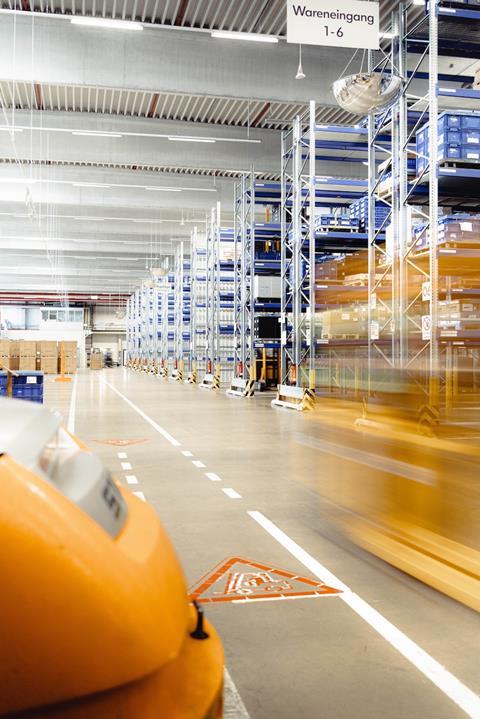
Meanwhile, crises which would have previously caused production stoppages and delivery shortages, including widespread transport-related strikes in Germany and diversions from Red Sea shipping routes, have led to few disruptions thus far. Motter credits these results to better anticipation and finding alternatives earlier in production, supply and transport, as well as better communication with stakeholders. For vehicle logistics, Group Logistics has worked with its partners to secure more capacity directly where needed. In the response to the Red Sea issues, the company has not only diverted ships – material for Volkswagen factories has even been trucked from China to Europe.
Going from crisis management to supply chain strategy and design
But whilst this task-force orientation has brought Group Logistics deeper into the layers of the supply chain, Simon Motter knows that it will be just as important to keep Volkswagen Group’s supply chain resilient over the long term. Motter believes strongly that logistics should be involved at the earliest stages of product and sourcing decisions, and thus help to ensure that changes to the production network avoid unnecessary cost, risk and emissions.
“In logistics, we have become more relevant and able to influence decisions, both in terms of ensuring stability, but also in terms of costs and emissions,” he says.
That influence has been increasingly evident across strategic priorities, including ramping up battery electric vehicle volumes, meeting sustainability targets and controlling costs. For example, Group Logistics has worked with plants in Zwickau and Braunschweig, Germany and Mlada Boleslav, Czech Republic to develop and implement an automated loading system to handle and transport battery modules by rail, which it will expand this year. Experts from Group Logistics have also worked closely with the carmaker’s PowerCo battery cell subsidiary, helping to choose locations and develop the infrastructure and requirements for the gigafactory it is building in Salzgitter and those it has confirmed to launch in Spain and Canada.
“That is one of the best things that can happen for us as a logistics organisation – that we are able to redesign something, and that is exactly what we are doing for electrification and batteries with our production network, our processes and technologies,” says Motter.
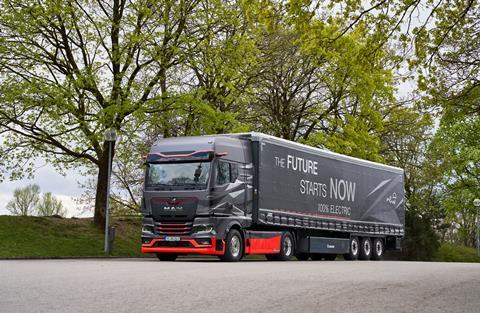
Group Logistics is also using lower emission transport and encouraging logistics providers to use greener technology and alternative fuels. This year it will see the first full electric trucks go into operation for Volkswagen’s material logistics in its collecting service network, which for example will see one of its partner in Germany, Duvenbeck, using e-trucks from MAN, also part of the Volkswagen Group.
Along with zero emission technology, Motter emphasises ‘defossilisaiton’ of its logistics operations, including for deep-sea shipping. This year, Group Logistics, which has long-term charters of pure-car-and-truck carriers (PCTCs), will continue to bring into operation in total four new dual fuel LNG ships, which will also have capabilities to use other, lower emission technology and fuels.
Digitalisation has also been one of Motter’s strategic pillars for gaining supply chain resilience, whether implementing microservices in transport systems, analysing the potential of artificial intelligence applications or leading on enterprise-wide changes. For example, Group Logistics is deeply involved in moving from legacy systems in inbound logistics to a cloud-based, SAP 4/Hana ERP that will eventually cover operations such as transport order management, warehouse, yard and plant logistics. Group Logistics is leading on the project, called ‘ONE Log’, which includes more than 200 cross-functional employees on the integration across production, plant logistics, IT and finance.
Motter is also looking at global opportunities to improve logistics performance. In North America, where Volkswagen is adding new products across existing operations in the US and Mexico and new plants both for PowerCo and its new EV truck brand, Scout, he has supported initiatives with local brand entities to deepen existing synergies in the region.
Oliver Bronder, head of vehicle logistics at Volkswagen Group Logistics, will be a keynote speaker at Automotive Logistics and Supply Chain Europe, March 19-21 in Bonn, Germany. The conference will feature major OEMs, suppliers and industry experts discussing how to leverage logistics as a competitive advantage. Find out more and register to join.Find out more and register for ALSC Europe
Developing ‘ideal’ logistics for the future supply chain
Recent spikes in logistics costs and risks have emphasised just how important visibility and holistic planning have become for complex supply chains. With uncertainty in the economy and the pace of EV demand, and rising competition among established and newer players in Europe, including from China, carmakers like Volkswagen will have to make considerable savings to remain competitive. Motter admits that will include significant efforts to reduce logistics costs.
But he also sees this objective as an opportunity for supply chain leaders to exert greater influence on strategic decision, including where it makes sense to localise supply chains. “If the individual logistics costs rise, as they have in almost every index across the industry including for Volkswagen, then we have to think about different levers, from the choice of transport carriers to sourcing,” he says.
Group Logistics is increasingly involved in identifying those levers. For new products and projects, it now develops what it calls ‘ideal logistics’ – an outline of what the most efficient supply chain and infrastructure would look like for an efficient logistics flow. This ‘ideal’ then becomes a basis to measure and compare with other objectives across procurement, finance and production. “We then go into discussion. For example, logistics would want to ensure that we have large modules located in a park that is connected to the assembly line with conveyor technology, or to have key suppliers able to deliver from close distances,” Motter says.
Compromises are always necessary, however the arguments for localisation and other logistics considerations are coming to the fore. “There are costs and efficiency reasons to consider, but increasingly also sustainability and resiliency reasons – and on these points our voice is being heard,” Motter says.
Group Logistics: seeking synergies, governing standards, building consensus
Volkswagen Konzernlogistik GmbH, or Group Logistics, is a limited liability company based in Wolfsburg, Germany, wholly owned by Volkswagen Group. With more than 800 employees, it is the central and coordinating organisation of the group’s logistics, but with a special set of functions ranging from the highly operational – including managing PCTC fleets and a returnable packaging network – to setting processes and standards across the entire group’s logistics.
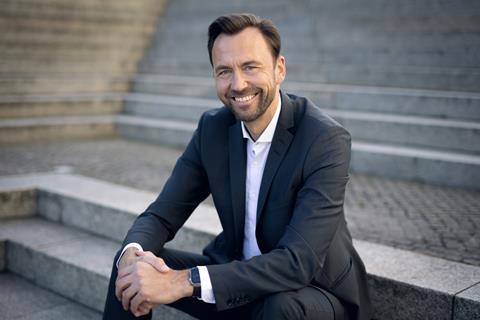
Simon Motter has been managing director and head of Group Logistics since January 2021, leading the full scope of the organisation. He previously held a range of logistics roles at Audi, including as head of international logistics, material logistics at Audi’s engine plant in Hungary, and most recently as head of plant logistics for the carmaker’s plant in Ingolstadt, Germany. Motter reports to Christian Vollmer, board member for production at Volkswagen.
Each brand of the Volkswagen Group is responsible for programme planning and logistics flows across their own plants, with factories usually responsible for plant logistics. Group Logistics, meanwhile, manages international material and vehicle logistics, along with synergies across multiple brands and shared suppliers. In Europe, where the group has the most plants and largest volume, Group Logistics operates material logistics, container management and vehicle logistics as a joint network, including cross-brand network design and forward planning, and the use of logistics digitalisation tools. Group Logistics also manages cross-company steering of critical parts and inventory. During the chip crisis, for example, it allocated chip supply based on company-wide priorities.
As a limited company, Group Logistics is responsible for purchasing and contracting for material and vehicle logistics services across Europe, and cross-regional flows. It also directly charters ro-ro ships, especially for Europe-North America trade.
It is a scope that continues to evolve. Recently, Group Logistics incorporated used car logistics into its European operations. During recent vehicle logistics capacity shortages, it chartered and commissioned vehicle logistics carriers across the continent as well.
Motter emphasises the ‘governance’ role among the most important for Group Logistics, such as setting network structures, standards and best practice, as well as coordinating cross-brand and functional projects. “It makes absolute sense that our brands and plants have their own logistics, but we want to find synergies, and to do that we need to find cooperation models to define common standards, which is such an important task,” says Motter.
“It makes absolute sense that our brands and plants have their own logistics, but we want to find synergies, and to do that we need to find cooperation models to define common standards, which is such an important task.” –Simon Motter, Volkswagen Group Logistics
This cooperation is often developed in working groups, in which a Group Logistics manager brings together leaders and experts from brand logistics, plants and other functions in a ‘group management circle’. These groups meet regularly to align on synergies and opportunities, as well as to settle political and technical issues. It’s a consensus-building body, but also one that uses tools and data to advise and take critical decisions where necessary, for example on logistics infrastructure, inventory and network design.
While the group has direct responsible for international transports, it does not usually take operational roles in global regions. Here, however, the governance role is important for developing standards and sharing best practice across entities. However, with the growth of key overseas regions, Group Logistics and its partner entities are aligning more closely.
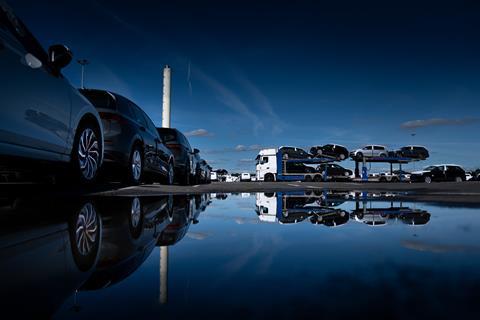
In China, for example, where Volkswagen Group operates across joint ventures with different Chinese companies, there is no single, countrywide shared logistics network. However, its JVs are exploring common logistics efficiencies, including establishing a returnable container management network closely modelled on the setup and system that Group Logistics runs in Europe, according to Motter.
In North America, Motter and Group Logistics are directly supporting regional efforts to find cross-brand and cross-country synergies. Volkswagen Group companies are building new factories, including for the Scout EV truck brand in South Carolina and battery cell maker PowerCo in Canada. Volkswagen Group is also investing across existing factories in the US and Mexico for Volkswagen and Audi, as well as commercial vehicle brands Navistar and Volkswagen Truck & Bus.
Whilst regional logistics and brand teams remain responsible for logistics in these regions, Group Logistics has done network studies on the region’s material logistics and production networks. At the Automotive Logistics & Supply Chain Mexico conference in November 2023, leaders from regional logistics leaders, together with Group Logistics head of global transport networks Christoph Hartmann, highlighted opportunities including cross-border flows, crossdocking, less-than-truckload and container management. The regional brands are currently planning tenders for some combined logistics services in the region.
“It is precisely our job in Group Logistics to exercise global governance on the one hand, and to leverage synergies concretely,” says Motter.
The synergy analysis is currently focused on material logistics and containers, but could expand to vehicle logistics within North America, where there are shared responsibilities between Volkswagen Group of America, and different brands in Mexico. But the company has yet to determine the pace of such developments, says Motter.
He also does not rule out the possibility that the group would eventually incorporate an entity in North America like Group Logistics in Germany, which could bundle certain services together. “The question arises, of course, but there is no definitive answer yet, as the business model may need to be different,” Motter says. “But we believe that sharing networks, as we do here in Europe, makes sense in North America.
“It’s important to take the first steps and to get concrete results, and then go forward from there,” he says.
Topics
- ALSC EUROPE 24
- Asia
- Audi
- Battery Supply Chain
- Cross-Border Logistics
- Deep sea
- Digitalisation
- Editor's pick
- Electric Vehicles
- Emergency logistics
- Europe
- features
- Finished Vehicle Logistics
- Inbound Logistics
- Interviews
- MAN Truck & Bus
- Nearshoring
- North America
- Porsche
- Ports and processors
- Rail
- Road
- Seat
- Shipping
- Short sea
- Skoda
- Supply Chain Planning
- Sustainability
- Volkswagen
Volkswagen Group Logistics series: Simon Motter on securing the supply chain
- 1
 Currently reading
Currently readingHow Group Logistics is overcoming crises and shaping Volkswagen's future supply chain
- 2
- 3
- 4
- 5


























![Global[1]](https://d3n5uof8vony13.cloudfront.net/Pictures/web/a/d/s/global1_726550.svgz)




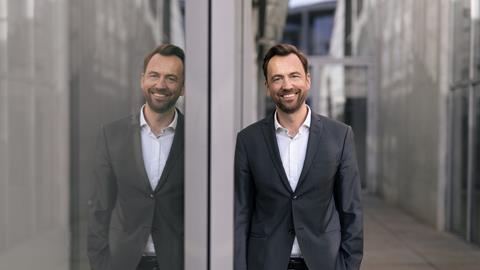





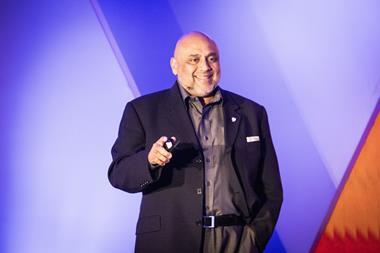


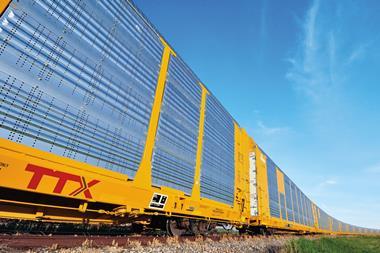
![Bild 1_Duvenbeck[99]](https://d3n5uof8vony13.cloudfront.net/Pictures/380x253/1/5/2/317152_bild1_duvenbeck99_485066.jpg)
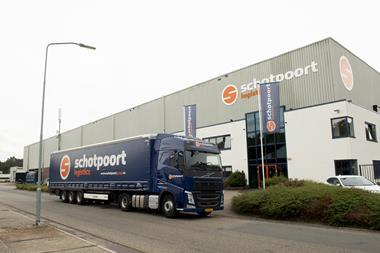



No comments yet